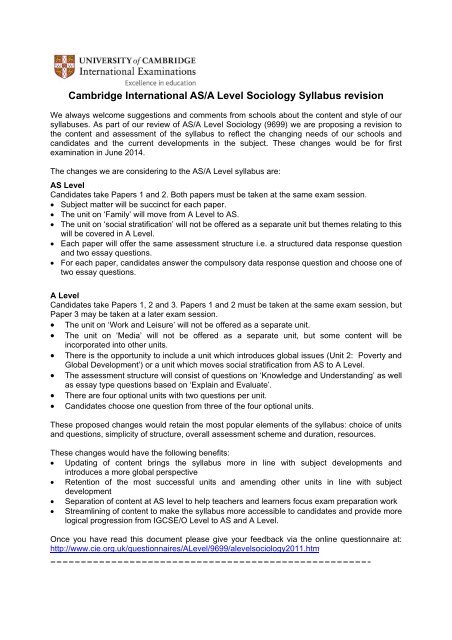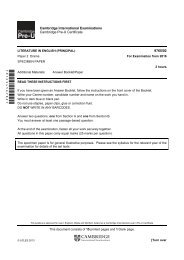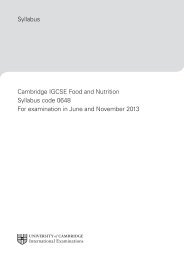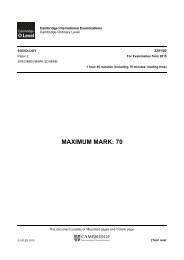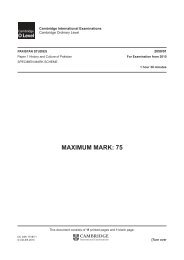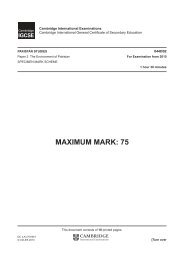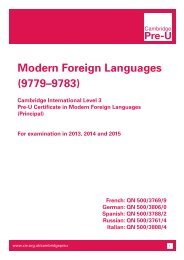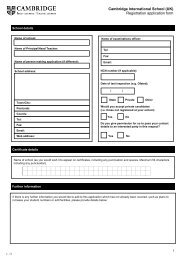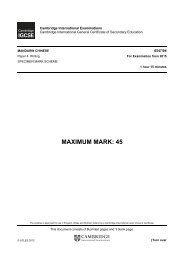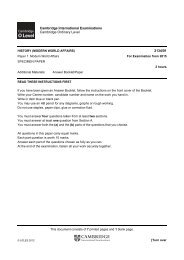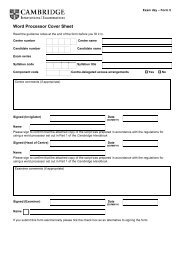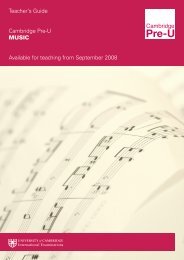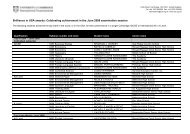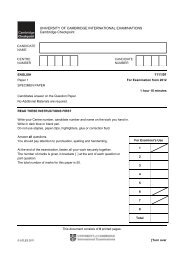Cambridge International AS/A Level Sociology Syllabus revision
Cambridge International AS/A Level Sociology Syllabus revision
Cambridge International AS/A Level Sociology Syllabus revision
You also want an ePaper? Increase the reach of your titles
YUMPU automatically turns print PDFs into web optimized ePapers that Google loves.
<strong>Cambridge</strong> <strong>International</strong> <strong>AS</strong>/A <strong>Level</strong> <strong>Sociology</strong> <strong>Syllabus</strong> <strong>revision</strong><br />
We always welcome suggestions and comments from schools about the content and style of our<br />
syllabuses. As part of our review of <strong>AS</strong>/A <strong>Level</strong> <strong>Sociology</strong> (9699) we are proposing a <strong>revision</strong> to<br />
the content and assessment of the syllabus to reflect the changing needs of our schools and<br />
candidates and the current developments in the subject. These changes would be for first<br />
examination in June 2014.<br />
The changes we are considering to the <strong>AS</strong>/A <strong>Level</strong> syllabus are:<br />
<strong>AS</strong> <strong>Level</strong><br />
Candidates take Papers 1 and 2. Both papers must be taken at the same exam session.<br />
• Subject matter will be succinct for each paper.<br />
• The unit on ‘Family’ will move from A <strong>Level</strong> to <strong>AS</strong>.<br />
• The unit on ‘social stratification’ will not be offered as a separate unit but themes relating to this<br />
will be covered in A <strong>Level</strong>.<br />
• Each paper will offer the same assessment structure i.e. a structured data response question<br />
and two essay questions.<br />
• For each paper, candidates answer the compulsory data response question and choose one of<br />
two essay questions.<br />
A <strong>Level</strong><br />
Candidates take Papers 1, 2 and 3. Papers 1 and 2 must be taken at the same exam session, but<br />
Paper 3 may be taken at a later exam session.<br />
• The unit on ‘Work and Leisure’ will not be offered as a separate unit.<br />
• The unit on ‘Media’ will not be offered as a separate unit, but some content will be<br />
incorporated into other units.<br />
• There is the opportunity to include a unit which introduces global issues (Unit 2: Poverty and<br />
Global Development’) or a unit which moves social stratification from <strong>AS</strong> to A <strong>Level</strong>.<br />
• The assessment structure will consist of questions on ‘Knowledge and Understanding’ as well<br />
as essay type questions based on ‘Explain and Evaluate’.<br />
• There are four optional units with two questions per unit.<br />
• Candidates choose one question from three of the four optional units.<br />
These proposed changes would retain the most popular elements of the syllabus: choice of units<br />
and questions, simplicity of structure, overall assessment scheme and duration, resources.<br />
These changes would have the following benefits:<br />
• Updating of content brings the syllabus more in line with subject developments and<br />
introduces a more global perspective<br />
• Retention of the most successful units and amending other units in line with subject<br />
development<br />
• Separation of content at <strong>AS</strong> level to help teachers and learners focus exam preparation work<br />
• Streamlining of content to make the syllabus more accessible to candidates and provide more<br />
logical progression from IGCSE/O <strong>Level</strong> to <strong>AS</strong> and A <strong>Level</strong>.<br />
Once you have read this document please give your feedback via the online questionnaire at:<br />
http://www.cie.org.uk/questionnaires/A<strong>Level</strong>/9699/alevelsociology2011.htm
<strong>AS</strong> <strong>Level</strong><br />
Content<br />
This would require candidates to study the family and age groups, together with theory and<br />
methods, at <strong>AS</strong> <strong>Level</strong>. There would no longer be a separate unit on social stratification.<br />
However, issues relating to social stratification will form underlying themes or a separate unit<br />
at A <strong>Level</strong> (Paper 3).<br />
The two <strong>AS</strong> <strong>Level</strong> papers will cover:<br />
Unit 1: Theory and Research Methods<br />
• Socialisation and Identity<br />
• Structuralist and interpretivist<br />
perspectives<br />
• <strong>Sociology</strong> as a science<br />
• The role of values in sociology<br />
• Primary and secondary data<br />
• Quantitative and qualitative research<br />
methods<br />
• The relationship between theory and<br />
methods<br />
Paper 1<br />
1.5 hours<br />
Unit 2: Family and Age Groups<br />
• Changes in family and household<br />
structures<br />
• The family and gender roles<br />
• Patterns of marriage and changing<br />
relationships<br />
• The family and wider society<br />
• Age groups and demographic<br />
change<br />
• The social construction of childhood<br />
and old age<br />
• Youth cultures<br />
Paper 2<br />
1.5 hours<br />
Through the inclusion of ‘family’ at <strong>AS</strong> <strong>Level</strong> the syllabus is more accessible to candidates and<br />
allows the candidates to build on prior learning when they move from IGCSE or O <strong>Level</strong> to <strong>AS</strong><br />
or A <strong>Level</strong>.<br />
Assessment<br />
For both papers at <strong>AS</strong> <strong>Level</strong>, there would be a Section A and a Section B. Section A would<br />
consist of a compulsory stimulus question based on a structured data response format.<br />
Section B would comprise two essay questions, from which the candidate would be required<br />
to answer one question. The mark weighting would be 50% Section A and 50% Section B.<br />
The combination of stimulus and essay questions would cater to candidates of varying<br />
abilities.<br />
2
A <strong>Level</strong><br />
Content (in addition to Unit 1 and Unit 2)<br />
We are proposing a reduction in the number of units at A level from 6 to 4. ‘Work and leisure’<br />
and ‘Media’ would no longer be offered as separate units. However, some material from the<br />
media unit would be incorporated within other units in the new syllabus. The following units<br />
are suggested:<br />
Unit 3: Education<br />
Unit 5: Religion<br />
Unit 6: Crime and Deviance<br />
We have two options for Unit 4 and will seek feedback on your preferences: ‘Poverty and<br />
Global Development’ or ‘Social Stratification’. Units are detailed further below:<br />
Unit 3: Education<br />
• The role of education<br />
• Education and the economy<br />
• Explanations of educational achievement<br />
• Education and equality of opportunity<br />
• The social construction of knowledge and learning<br />
• Streaming, labelling and pupil sub-cultures<br />
Unit 4: Poverty and global<br />
development<br />
• Theories of poverty<br />
• The measurement of poverty<br />
• The nature and distribution of<br />
poverty<br />
• Global inequality and strategies<br />
for development<br />
• Theories of global development<br />
• Migration and its social impact<br />
Unit 5: Religion<br />
• Theories of ideology and religion<br />
• Religion and social change<br />
• The secularisation debate<br />
• Social diversity and religious practice<br />
• Religious movements<br />
• Religion - modernity and post-modernity<br />
Unit 6: Crime and Deviance<br />
• Theories of crime and deviance<br />
• The sociological study of suicide<br />
• Deviance, power and social control<br />
• Societal reaction to crime and deviance<br />
• Measurement and patterns of crime<br />
• Explanations of the social distribution of crime<br />
or<br />
Unit 4: Social stratification<br />
• Theories of social stratification<br />
• Dimensions of inequality:<br />
power, status, income and<br />
wealth<br />
• Patterns of social mobility<br />
• Class boundaries and social<br />
change<br />
• Gender inequality<br />
• Ethnic inequality<br />
3<br />
In the accompanying questionnaire we ask<br />
you to state which you prefer for inclusion in<br />
the syllabus.
Assessment<br />
There will be one exam paper (Paper 3) which will be divided into four units. We are proposing<br />
that there will be two questions for each unit, with each question composed of two parts. The<br />
first part will require an explanation for 9 marks and the second part will require an evaluation<br />
for 16 marks. Candidates will be required to answer three questions taken from separate units<br />
of the exam paper.<br />
4
Assessment Structure for the proposed syllabus<br />
5


